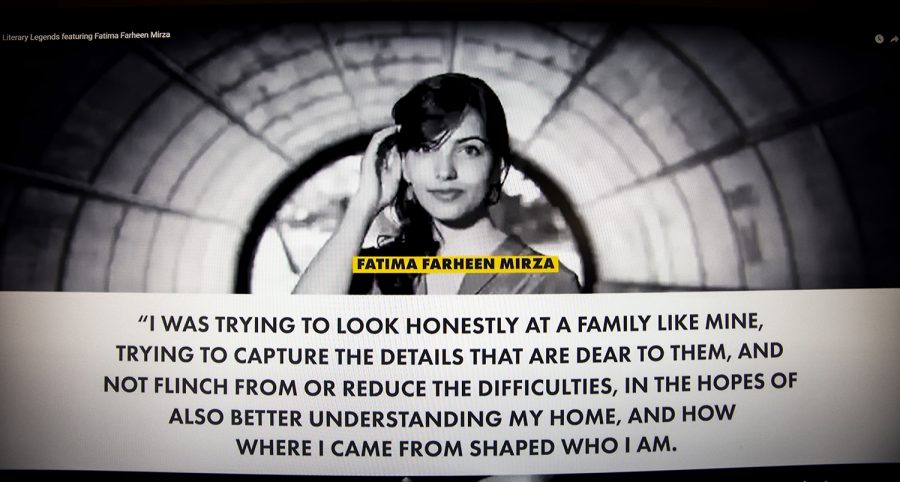Fatima Farheen Mirza reads from unfinished second novel at UI Literary Legends event
Author and Iowa Writers’ Workshop graduate Fatima Farheen Mirza read a preliminary portion of her second novel and discussed the writing process, her time at Iowa, and representation of underrepresented groups in literature and media with Stephen Lovely today as part of a Literary Legends event hosted by the UI Center for Advancement.
Photo Illustration by Jeff Sigmund on Thursday, April 15, 2021.
April 15, 2021
Fatima Farheen Mirza began her undergraduate career believing that she was going to be a doctor. Mirza quickly abandoned this idea when she realized she hated all of her pre-med courses and she instead switched her major to pursue creative writing. She is now a graduate of the Iowa Writers’ Workshop and author of the New York Times Best-Selling Novel A Place For Us.
On Thursday afternoon, the University of Iowa Center for Advancement hosted Mirza in a virtual event as a part of the Literary Legends series. She read from a potential portion of her new novel that she is currently working on and engaged in a conversation with director of the Iowa Young Writers’ Studio and author Stephen Lovely about the writing process, the publishing process for her first novel, her time at UI, and Muslim representation in literature and media.
In addition to being a New York Times Best-Selling Novel, A Place For Us is also a New York “One Book, One New York” pick, and was named one of the best books of 2018 by Washington Post, NPR, Refinery 29, Buzzfeed, Parade, and Real Simple. In addition to her novel, Mirza has two published essays: “Boxing” in Granta magazine and “Skittles” in The Good Immigrant.
The novel follows a devout Muslim family living in California at the turn of the 21st century as an Indian wedding brings the family back together. Mirza’s website describes the book as “a book for our times: an astonishingly tender-hearted novel of identity and belonging, and a resonant portrait of what it means to be an American family today.”
The event opened with Mirza reading from a preliminary portion of her second novel. She noted that she is still figuring out the different characters and that what the audience heard was subject to change. The reading led to a discussion about Mirza’s writing process and how she has moved from writing her first novel to writing her second.
“It’s been tough, but I don’t think that’s because it is a first novel or second novel. Novels, in general, are so complex and demand so much from you,” Mirza said at the event. “After I wrote A Place For Us, I didn’t want to write again for a while. I didn’t write again for about another year because I didn’t want to write the same thing again.”
She said that the success and publicity that her first novel received made it difficult to write again because of the pressure she felt for the second novel.
“Mainly, it feels like a lot of pressure. I’m feeling like I can’t bring that into this project. Every book is its own journey,” Mirza said.
Mirza had been writing her novel since age 18. She said that her time at the Iowa Writers’ Workshop helped her develop the novel into what it became. She specifically referenced Marilynne Robinson, one of her professors, who pushed her to work with her characters in a deeper way.
The author also noted the profound impact that teaching has had on her and spoke about some of her first experiences teaching fiction and creative writing classes at UI as a graduate student.
The event finished with a discussion about how the Muslim community has been represented in literature and other media as well as how other underrepresented groups are being portrayed. Mirza said she hopes that as more literature of underrepresented groups surface, that people will see there are many possible representations.
“What role literature plays is that it allows us all to contribute our voice. For me, the hope is that we will be able to see all of these stories together,” Mirza said. “My hope is that all the voices will contribute to show that everyone’s life is unique to them.”



